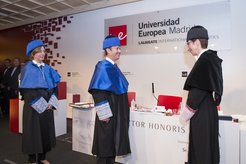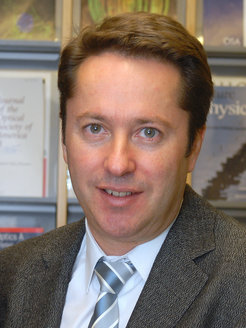Professor Ignacio Cirac receives the Honorary Doctorate from the Universidad Europea de Madrid
At the opening of the academic year, the Universidad Europea de Madrid awarded the Honorary Doctorate to Professor Ignacio Cirac on 22 September 2016.
Professor Ignacio Cirac, director at the Max Planck Institute of Quantum Optics (Garching, near Munich) and head of the Theory Division, has received this honour for “his contribution to the field of quantum information and, in particular, for his concepts of quantum computers which will revolutionize the development of new materials in the near future”, as Prof. Lluís Torner, director of the ICFO-Institute (Barcelona), pointed out in his eulogy. In his response, Professor Cirac emphasized the high potential of quantum information: “We are now coming to the point where we can develop quantum devices that change our society. To this end, we have to educate engineers in the field of quantum physics, and we need the support from the industry and the entrepreneurs.” The ceremony was also attended by Prof. José Manuel Torralba, General Director for Universities and Research of the Region of Madrid. The Universidad Europea is a private university, enrolling over 16,000 students in 23 educational courses. Since 1999 it has belonged to the Laureate International Universities network, offering higher education to over 1,000,000 students from all over the world. The Universidad Europea de Madrid has awarded so far 17 Honorary Doctorates, among them to Durão Barroso, Lech Walesa, Nelson Mandela, Mario Vargas Llosa, Plácido Domingo or Rafael Nadal.

At the centre of Prof. Cirac’s research is the development of a new information theory based on the laws of quantum mechanics. New ways of controlling the world of atoms, molecules, and photons are being explored in order to exploit their quantum mechanical properties for storing and communicating quantum information with ever higher efficiency and security. These investigations are leading to new concepts for future quantum computers. The Theory Division of Prof. Cirac has for example developed new concepts for logical elements such as quantum gates that have already been implemented by experimental physicists. Furthermore, the group develops new algorithms for quantum communication, designs new quantum networks making use of the special properties of quantum particles, and creates new theoretical tools to characterize and quantify e.g. entanglement of remote quantum systems.

Another strong focus of Prof. Cirac’s research is the simulation of the behaviour of quantum many-body systems with ultracold atoms in optical lattices. For example, such systems can serve as models for solid states crystals. This work will lead to a better understanding of macroscopic phenomena such as magnetism and superconductivity, but it also aims to get a deeper understanding about the true nature of light and matter.
Information on Ignacio Cirac:
Professor Ignacio Cirac was born in the City of Manresa in 1965. He studied theoretical physics at the Universidad Complutense de Madrid where he received his PhD in 1991. He began his career in physics as a “Professor Titular” at the Universidad de Castilla-La Mancha where he stayed till 1996. In 1996 he became Professor at the department of Theoretical Physics at the University of Innsbruck. Since 2001 he is Director at the Max Planck Institute of Quantum Optics and head of the Theory Division.
Professor Ignacio Cirac is a world-expert in the field of quantum information and quantum computation. In 2005 he was awarded the “Quantum Electronics Prize” of the European Science Foundation. In May 2006 he was the youngest ever winner of the renowned Royal Spanish Prince of Asturias Prize, and in the same year he received the International Quantum Communication Award together with Professor Peter Zoller (University of Innsbruck). In 2009 he shared the “Frontiers of Knowledge Award in Basic Sciences” of the Spanish BBVA Foundation as well as the Benjamin Franklin Medal of the Franklin Institute in Philadelphia (USA) with Professor Peter Zoller. In January 2013 he received both the Israeli Wolf Prize and the Niels Bohr Medal. In 2014, Prof. Cirac received the Honorary Doctor from the University of Zaragoza. In 2015 he got the Hamburg Prize for Theoretical Physics, and in January 2016 he was elected ordinary member of the Royal-Spanish Academy of Sciences. Olivia Meyer-Streng

